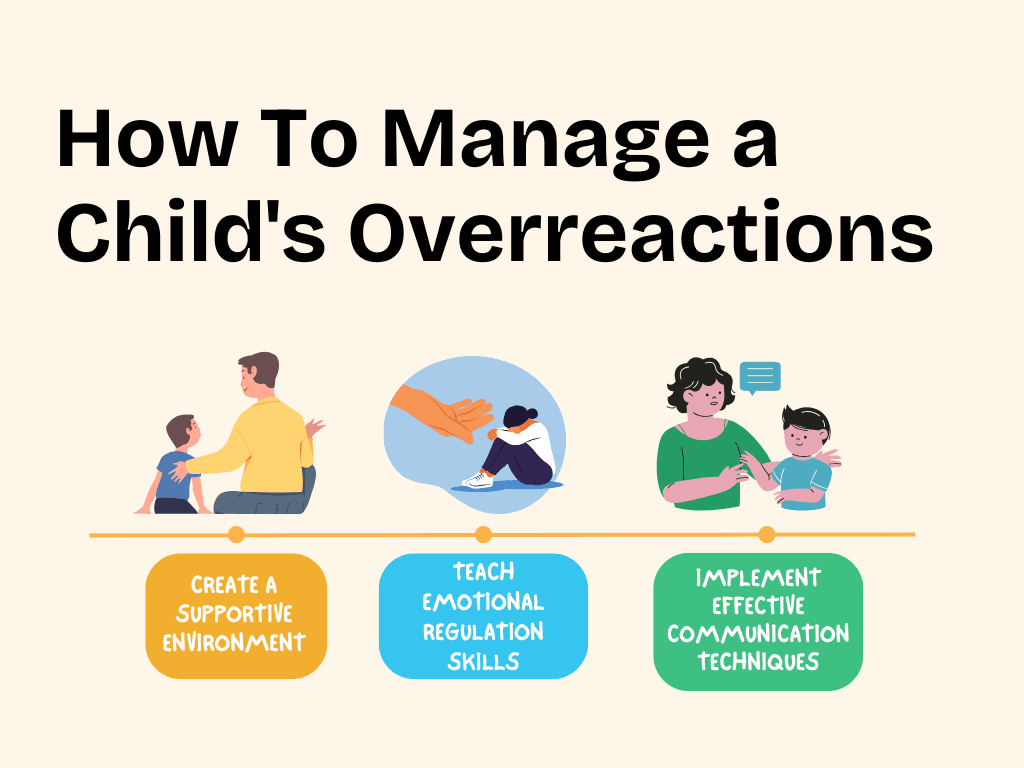How to Support an Angry Child
Learn effective strategies to support an angry child, help them manage emotions, and create a calm, understanding environment for healthier communication.


Key Takeaways
- Anger is a normal human emotion, but some children may have trouble expressing it in healthy and safe ways.
- You can help your child navigate anger by explicitly teaching them anger management tools, modeling healthy behavior, and staying as calm as you can.
- If your child’s challenges with anger are related to an underlying mental health or neurodevelopmental condition, then professional treatment may help both you and your child.
As a parent, you’re probably familiar with anger to an extent. The door slamming. Your child yelling, “I hate you!” and storming off. Or maybe it’s a full-blown tantrum — screaming, throwing things, and completely overwhelmed with rage.
It’s hard not to take your child’s anger personally. It’s exhausting, and it can leave you feeling helpless — or even angry yourself.
But these emotional outbursts aren’t always about defiance or disrespect. Often, children act out in anger because they don’t yet have the tools to express what they’re feeling in a safe and appropriate way.
Your child’s anger is valid — and so is your frustration with it. But it doesn’t always have to be like this. With the right support, children can learn how to manage big emotions, and parents can feel more confident in how they respond to it.
Why Some Children Struggle with Anger
To be clear, every human experiences anger, including children. It’s normal to be angry sometimes. When children (or adults) appear to “have anger problems,” it’s often about how they manage these feelings, not about the fact that they feel anger at all.
For example, a child might act out in physical violence when they’re angry — hitting, kicking, or scratching. Or they might express their anger in other ways, like screaming and throwing temper tantrums. It’s okay to feel angry, but the way they’re managing and expressing their anger can become difficult to handle.
There are many different reasons why a child might have a hard time managing their anger. Some common factors include:
- Temporary tiredness or hunger: Children are more likely to have outbursts when their basic needs aren’t being met. A tired, overstimulated, or hungry child may not have the emotional bandwidth to cope with frustration, which could cause them to act out.
- Hormonal changes (adolescence): Research shows that irritability is normal and common between the ages of 9 and 16. Especially during adolescence, your child might be going through hormonal fluctuations that can affect their mood and temper.
- Learning problems: When children struggle with learning, especially in school environments, they may feel frustrated or embarrassed, and they might express that frustration as anger. They might feel especially angry (and rightfully so) if they’re consistently labeled as “lazy” or “dumb” because of their difficulties.
- Sensory processing issues: If your child is sensitive to noise, texture, or light, then that sensory overstimulation can trigger a strong emotional reaction. They might not be able to explain what’s bothering them, so it comes out as anger.
- Modeled behavior: Sometimes, children may act violently when they’re angry because that’s how they’ve observed adults express their anger. They may simply not have learned other ways to express their anger.
Sometimes, difficulty with anger management could also be related to underlying mental health or neurodevelopmental conditions, including:
- Attention-deficit hyperactivity disorder (ADHD): ADHD can cause difficulty in emotional regulation, which means that it can be more difficult to manage emotions. So children with ADHD might have a more difficult time calming themselves down when they’re angry.
- Autism: Some children on the autism spectrum may have difficulty expressing how they feel, especially when they’re overwhelmed or overstimulated. Autistic children are also more likely to experience sensory overstimulation. This can sometimes come across as anger or aggression.
- Anxiety: Children with anxiety may feel constantly on edge. When they’re overwhelmed, they might respond with anger, especially if they feel like they’re losing control. Feeling invalidated in their anxiety can make them feel even angrier.
- Depression: Although depression is typically associated with sadness, some research suggests that young people, especially boys, are more likely to experience an irritable mood with depression than sadness.
- Trauma and attachment issues: When a child has experienced trauma or has an attachment disorder (like reactive attachment disorder), they may be more likely to act out in anger.
How to Help a Child Manage Their Anger
It can feel frustrating and overwhelming to watch your child struggle with anger.
Try to remember that they aren’t intentionally trying to annoy or hurt you — they simply need support in learning how to manage their anger in developmentally appropriate ways.
Here are some ways you can help your child.
Notice their triggers
Start to pay attention to when your child tends to have the most intense outbursts. Is it before meals? After school? When plans change? Identifying patterns can help you both get ahead of the anger.
Validate their emotions
Angry or emotional children (and adults!) need to feel validated. Let your child know it’s okay to feel angry.
You can say something like, “It looks like you’re really mad right now. That’s okay. Tell me more about what’s making you angry.” Validation can help them feel safe and understood, which actually makes it easier for them to calm down.
Stay calm
It can be so easy to become overwhelmed and respond back with anger.
But, as hard as it is, staying calm models emotional regulation for them. Take a few deep breaths and speak in a steady, soft tone. Your calm presence can help de-escalate the situation and show your child what it actually looks like to stay grounded.
Reinforce positive behavior
Catch your child when they’re doing well with managing their anger, and praise them for using healthy ways to cope. Reinforce moments when they express anger without yelling or hitting. Note that this is different from praising them for not feeling angry at all.
When children know what you want to see more of — and feel good about doing it — they’re more likely to repeat it.
Teach them skills and alternative behaviors
Explicitly teach your child the specific tools they need to manage their anger in safe, acceptable ways.
Examples might include taking deep breaths, squeezing a stress ball, or asking for space. Role-playing can also be a helpful teaching tool. You could even help them build a physical toolbox of strategies they can reach for the next time they feel overwhelmed.

What to Avoid When Your Child is Angry
When your child is angry, what you do as a parent makes a big difference. Some reactions can make children feel even angrier and make meltdowns worse.
When you’re dealing with your child’s anger, try to avoid:
- Responding with anger: Yelling, threatening, or becoming visibly upset can escalate the situation. Your child may feel even more out of control and get even angrier.
- Invalidating their feelings: Saying things like “This isn’t a big deal! or “There’s nothing to be mad about,” teaches children that their emotions aren’t valid. This can increase the shame they feel about anger and make it harder for them to open up in the future.
- Allowing them to do physical harm to themselves or others: It’s important to keep everyone safe — this should be the priority. If your child becomes physically aggressive, calmly intervene and set firm limits.
- Withdrawing your love: Don’t use affection or attention as a bargaining chip. Saying things like “I hate you when you act like this” can be deeply damaging to your child. Even when setting limits, it’s essential to let your child know that your love for them is unconditional.
When to Seek Professional Help
Sometimes, heightened irritability or difficulty regulating anger might just be temporary, like during the teen years. But it could also be related to an underlying condition, like ADHD or depression.
If you suspect that there might be something deeper going on, it’s critical to get your child connected to professional support as soon as you can.
Conditions like depression and even attachment disorders can be successfully treated, but they’re unlikely to go away on their own.
A child therapist can help both you and your child learn more about the root of your child’s anger, and teach you both skills to help them better regulate their big emotions.
If your child harbors anger or resentment toward you or another family member, specifically, then it’s important to address that as well.
Family therapy can provide a neutral and nonjudgmental space to explore what happened, the events that have led to feelings of anger, and how to move forward and heal the relationships.
Bottom Line
Anger is normal, and it isn’t necessarily a cause for concern. But if you feel like your child is suddenly angrier than usual, or if they’re expressing their anger in hurtful or violent ways, then they may need your support in learning how to better regulate their emotions.
At Emora, we understand how overwhelming it can feel when your child’s anger becomes too much to manage on your own. Our child therapists are trained to support kids through emotional regulation challenges, including those related to ADHD, anxiety, depression, trauma, and more.
We also work directly with parents to help you feel more confident in responding to your child’s big emotions. If your child is struggling with anger, reach out to get matched with a therapist who can help.





